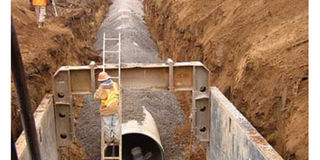KCCA, National Water move to manage city faecal sludge

A sewer line. COURTESY PHOTO
What you need to know:
- The plan comes hot on the heels of uproar from the public over open defecation that has left many parts of the city littered over lack of latrines among some city residents.
- The stakeholders are devising ways on how to improve the collection and transportation of faecal sludge from the city to the treatment plants hence promoting sanitation with support from the Reinforcing African Sanitation Operators (Rasop) through peer-to-peer partnerships.
- According to Dr Niwagaba, with such alarming figures of uncollected faecal sludge, the prevalence of diseases in the city might shoot up leading to loss of lives.
KAMPALA. Kampala Capital City Authority (KCCA) and the National Water and Sewerage Corporation (NWSC) are finalising plans to improve the management of faecal sludge in Kampala.
Faecal sludge is a mixture of human excreta, water and solid wastes including anal cleansing materials, menstrual hygiene management, diapers, plastics, paper and other solid waste that are disposed in the pits, tanks or vaults of on-site toilets and sanitation systems, instead of going into centralised waste water treatment systems.
The plan comes hot on the heels of uproar from the public over open defecation that has left many parts of the city littered over lack of latrines among some city residents.
According to the plan, the project is targeting to improve latrine facilities in Kampala slums by connecting sewer lines to avoid littering the city with waste.
Mr Paddy Twesigye, the director planning capital development at NWSC, told reporters during a workshop in Bugolobi on the management of faecal sludge recently, that NWSC received Euros 20m from the government of Germany to improve sanitation in city slums.
“We are still carrying out assessment in these slums and once we are done, we shall embark on the project. Our plan is to have all people connected to the sewer lines to mitigate open defecation, which comes with diseases,” he said.
He noted that they are working with KCCA to implement the project in Kampala City.
Mr Twesigye also revealed that NWSC is set to construct treatment plants in Kinawataka, Lubigi and Nalukolongo. Currently, there is only one treatment plant in Bugolobi.
The stakeholders are devising ways on how to improve the collection and transportation of faecal sludge from the city to the treatment plants hence promoting sanitation with support from the Reinforcing African Sanitation Operators (Rasop) through peer-to-peer partnerships.
Rasop is a project funded by the Bill and Melinda Gates Foundation and implemented by the African Water Association (Afwa).
Poor management
Dr Charles Niwagaba from Makerere University’s department of civil and environmental engineering, who is also a Rasop consultant, noted that at least 46 per cent of Kampala City’s faecal sludge isn’t collected and transported to the treatment plant.
As a result, he said it either overflows into different drainage channels or dumped anywhere.
Prevalence of diseases
According to Dr Niwagaba, with such alarming figures of uncollected faecal sludge, the prevalence of diseases in the city might shoot up leading to loss of lives.
“Whereas there are a few rich people whose faecal sludge is collected by a sewer, which is managed by National Water and Sewerage Corporation, some of the urban poor, who actually form the largest part of Kampala’s population don’t have money to empty their toilets and as a result, it just overflows hence poor disposal,” Dr Niwagaba says.
High costs
Faecal sludge management in Kampala is hindered by high costs of onsite sanitation and emptying services, lack of faecal sludge transfer stations, lack of sufficient decentralised faecal sludge treatment facilities and insufficient resources among others.
Mr Allan Nkurunziza, the KCCA project manager Kampala faecal sludge management, said they are currently looking for funding, especially from donors so that the project can kick off.
“We realised that many buildings in the city aren’t connected to the sewer line. This is a health risk. KCCA is now embarking on standards to improve faecal sludge management, which will be integrated with physical planning,” he said.
Private emptying companies
He said some of the urban poor in Kampala can’t afford to hire private emptying companies to collect and transport faecal sludge from their pit-latrines hence open defecation, something he said, they want to fight by having all buildings connected to the sewer.
Currently, KCCA only collects faecal sludge from city public institutions such as public schools and markets while private companies collect the rest but at a fee.



